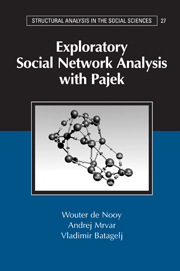Book contents
- Frontmatter
- Contents
- List of Illustrations
- List of Tables
- Preface
- Part I Fundamentals
- Part II Cohesion
- Part III Brokerage
- Part IV Ranking
- 9 Prestige
- 10 Ranking
- 11 Genealogies and Citations
- Part V Roles
- Appendix 1 Getting Started with Pajek
- Appendix 2 Exporting Visualizations
- Appendix 3 Shortcut Key Combinations
- Glossary
- Index of Pajek Commands
- Subject Index
10 - Ranking
Published online by Cambridge University Press: 05 June 2012
- Frontmatter
- Contents
- List of Illustrations
- List of Tables
- Preface
- Part I Fundamentals
- Part II Cohesion
- Part III Brokerage
- Part IV Ranking
- 9 Prestige
- 10 Ranking
- 11 Genealogies and Citations
- Part V Roles
- Appendix 1 Getting Started with Pajek
- Appendix 2 Exporting Visualizations
- Appendix 3 Shortcut Key Combinations
- Glossary
- Index of Pajek Commands
- Subject Index
Summary
Introduction
In the social sciences, society is regarded as a set of social layers or strata. Instead of ranking people, groups, or organizations on a continuous scale of prestige, they are usually classified into a limited set of discrete ranks, for instance, working class, lower middle class, upper middle class, and upper class. Within a group of humans, discrete ranking also occurs, for instance, leaders, followers, and outcasts. The stratification of art worlds into stars, settled artists, and mediocre artists is likely another example. In this chapter, we discuss techniques to extract discrete ranks from social relations.
Social ranking may be formal or informal and the two types of ranking may coexist. In a formal ranking, it is written down who commands whom and insignia or symbols minimize the ambiguity of the ranking and preclude any confusion about a person's rank. The army is an obvious example with its elaborate hierarchy. In contrast, an informal ranking is neither written down nor expressed by official symbols. It manifests itself in the opinions and behavior of people toward each other: respect and acts of deference versus disrespect and dominance.
The creation and maintenance of an informal ranking is a very important social process. Social network analysis is needed to investigate it and to assess the positions that individuals occupy within the informal ranking.
- Type
- Chapter
- Information
- Exploratory Social Network Analysis with Pajek , pp. 204 - 225Publisher: Cambridge University PressPrint publication year: 2005

